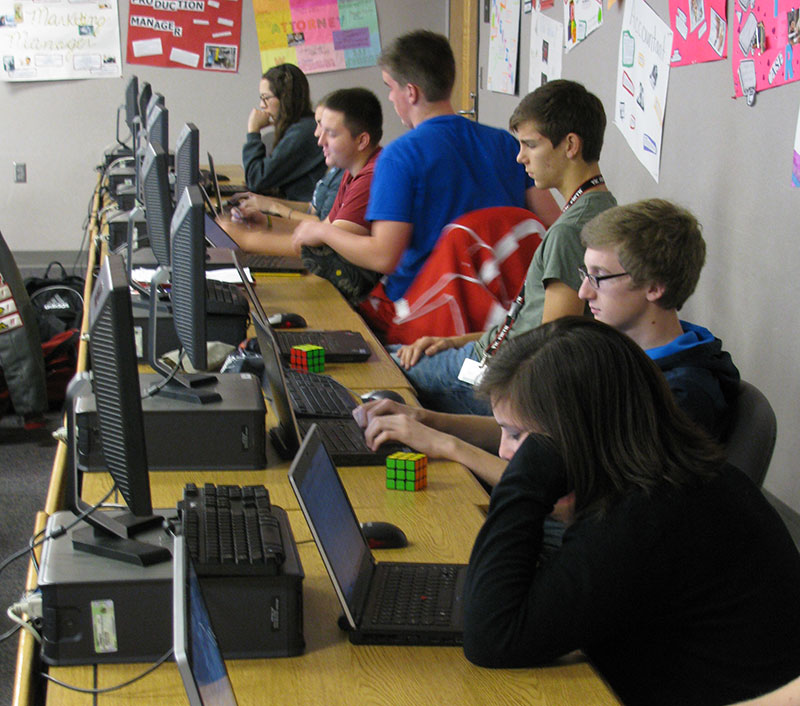GHS students preparing for college and career through intensive International Baccalaureate program
|
Each year, more and more Goshen High School students are graduating better prepared and ready to take on college courses because of the International Baccalaureate (IB) program. The IB diploma program is a curriculum used around the world that asks students to complete IB-level courses in English, a second language, math, science, social studies and an elective, including music or art. Students working towards earning the full diploma must also complete a minimum of 150 hours in “creativity, action and service activities” through extra-curricular, community service or other such activities, a 4,000-word original research essay and the Theory of Knowledge course. Students not pursuing a full diploma can also take IB courses. The classes themselves are also structured in such a way that encourages more independent thought in students and asks them to develop and follow-up on their own creative projects. “It’s really about thinking,” said GHS Principal Barry Younghans. The classes may be more intense, but if students pass the corresponding IB exams, they can earn college credit. Full IB diploma candidates can earn up to one year of college credit at certain universities, but Younghans said that, credit aside, the courses prepare students more than traditional classes. A 2011 GHS graduate who earned an IB diploma agreed with Younghans that “IB, regardless of whether you get college credit or not, was very beneficial because it taught me how to study and it prepared me for difficult classes while at college.” Younghans explained how, unlike traditional classes that focus on the repetitive practice of concepts, IB really works to have students learn concepts more in-depth and to pull in concepts from other disciplines that the name of that particular class. “We think it is the best way to prepare kids for college and career,” Younghans said. “We think it asks kids to think at an extremely high level. We think it asks kids to demonstrate high levels of effort and perseverance. We think that it demonstrates to the community and to the state that our kids stack up because the work is scored throughout the world.” Students are much more independent in their learning in IB classes. Younghans gave the example of students creating their own science laboratory experiment, creating the hypothesis, working through the experiment and writing a report on what happened, even if the experiment failed. That’s different than in typical high school sciences classes, and even many college science classes, where students would just replicate an experiment given to them, he said. The past several weeks, the students in Todd Kirkton’s IB math class have been working on math research papers. Students had to choose a general topic they were interested in, then somehow relate math to that subject. By leaving the assignment so open-ended, students have had to pull from several different mathematical areas — statistical probability, algebra, geometry, calculus, rather than just one area like more typical high school courses would do. One student in Kirkton’s class used his interest in baseball to look at the amount of home runs and the true distance of hits through the professional season. He found that power hitters actually become less successful through the season, while pitchers are becoming more successful by throwing more accurately and hitting at their desired elevation angle. |
What recent graduates are saying: “IB helped me become a better student since it taught me how to deal with a big workload in school, which is essential for college. Time management has never been one of my strengths, and IB made me have to focus on strengthening that aspect of my life. When I was actually in IB, there were times when I questioned why I did it, but the impacts it has had on my college life make it worth it. Coming in to college with 23 credits has reduced my workload in different ways, and I’m so happy I decided to take that path.”
“IB, regardless of whether you get college credit or not, was very beneficial because it taught me how to student and it prepared me for difficult classes while at college. With IB I was able to become super close with a little family, due to TOK (Theory of Knowledge), who were all in the same boat as me and were there for each other. It was overall an experience I would not change, even though it was very stressful at some points, it was learning that I feel most high school seniors will never get without doing IB.”
“The IB program at Goshen High School changed the way that I think. IB encouraged me to become a better critical thinking- whether it was through the unique examination style, the extended essay, or ToK (Theory of Knowledge). I really appreciate the level of preparation it game me for college. The rigor of the program also helped me to push myself to do things I thought I couldn’t do- especially writing the extended essay. I now write papers and laboratory reports like this all the time and I think I was better prepared for these than some of my peers due to IB.”
“IB was a succession of challenges. It was a lot of hard work and extremely stressful but the students in my class bonded over the mutual struggles. To this day if there seems to be an impossible task I muster up the confidence to do it by reminding myself that I made it through IB. It was an incredible experience that I will always be proud of.” |
|
Another student said he’s known how to solve a Rubic’s Cube for quite a while, but didn’t really know exactly how he was solving it. In his paper, the student talks about how doing sets of moves, called algorithms, can return the Rubic’s Cube to its solid-colored sides and how to use those algorithms to predict how many moves it could take to finish the cube. Last week, a Goshen High School IB art student was able to do her first raku firing — a Japanese process of firing ceramic pots. In the process, pots are fired until they are glowing red hot in a kiln, then quickly removed and placed in the ground or in a container surrounded by newspapers, straw or other such materials. 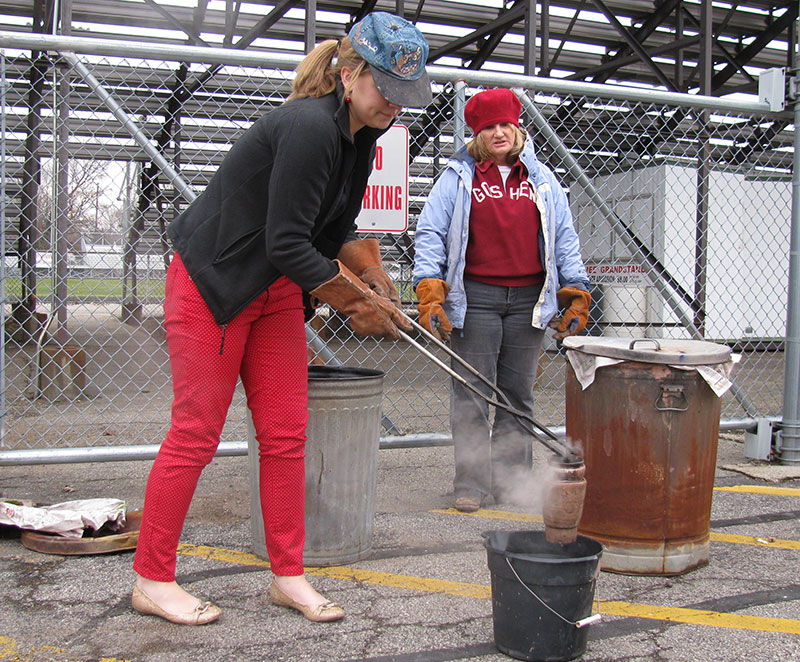 An IB art student places a raku-fired clay piece into water, as teacher Cindy Cooper watches Art teacher Cindy Cooper noted that the student had not only studied the process but the Japanese tea ceremony that includes raku pieces, the history of raku and more. 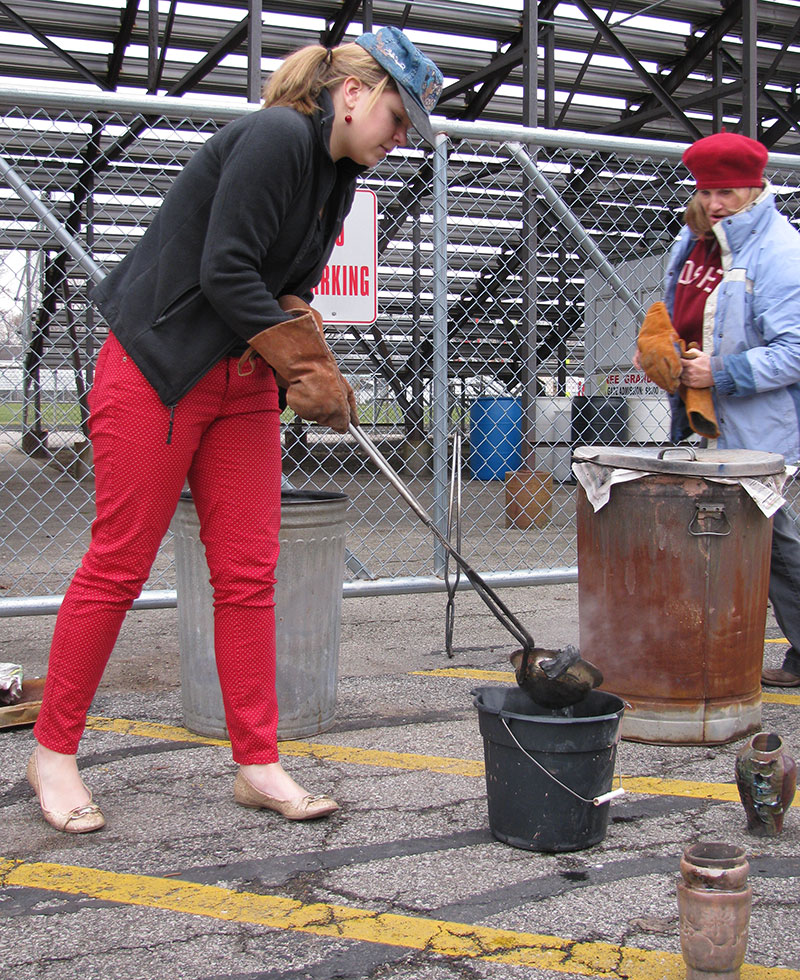 An IB art student places a raku-fired clay piece into water “That’s what IB is,” Cooper said, pointing out the comprehensive and integrated penchant. “It’s my favorite class because it’s so in-depth.” 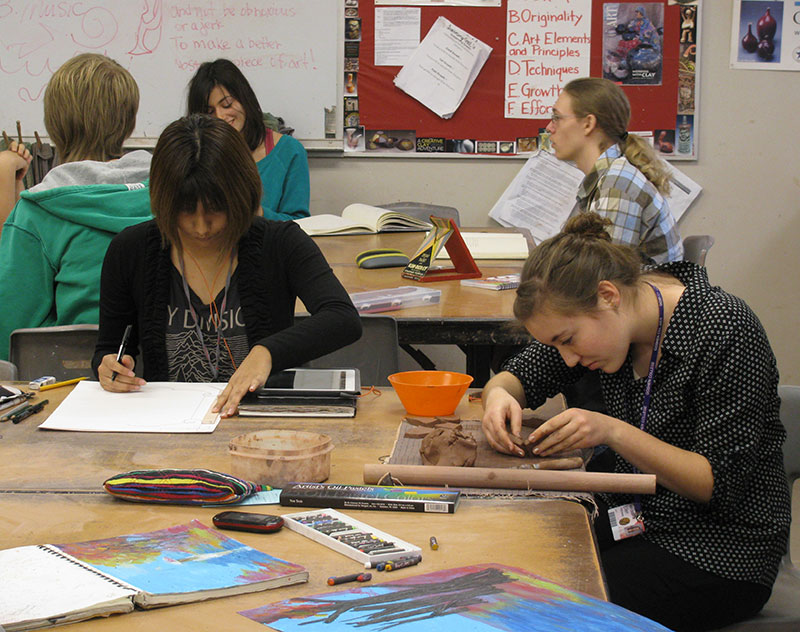 Students work on projects in Cindy Cooper’s Ib art class. Kirkton and Cooper both pointed out the creativity that IB classes nourish. In Cooper’s IB art class, students must complete “investigative workbooks,” sketchbooks that students develop and process ideas through writing, sketches, painting and other mediums. 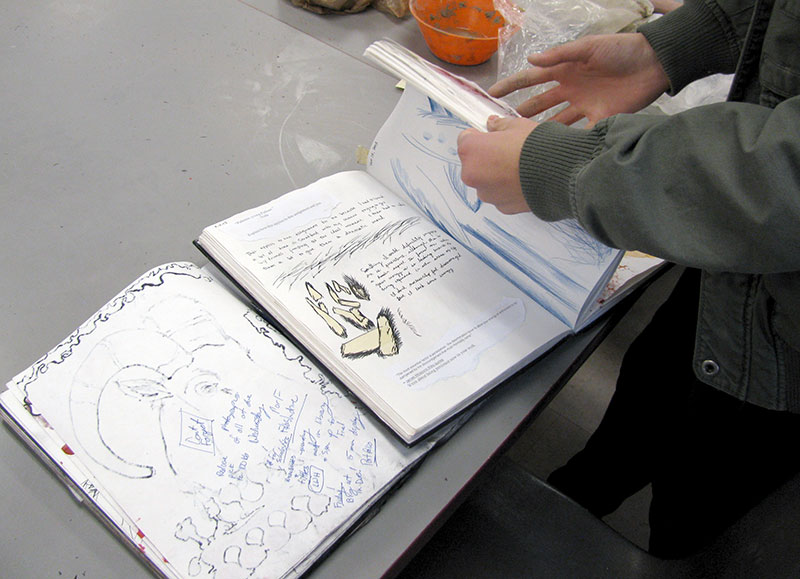 A student flips through her “investigative workbook” for her IB art class. In the investigative workbooks, students create and process ideas. Students pursuing the full diploma must also complete the class Theory of Knowledge, which Younghans described as a class where students think about thinking. In the class, students practice critical thinking, while also examining cultures and bringing together the learning they have done in all other subject courses. Students graduating this next spring with IB diplomas will be the fifth class of IB graduates at GHS. The program has continued to grow each year and, unlike some schools where students may only work towards or a full diploma or that only allow certain students to participate in IB, any students interested in doing the work and improving themselves through IB are welcome to take any classes or pursue the diploma. While many assignments in IB courses are scored by GHS teachers, several, including the end of class exam, is scored by an external IB examiner. In 2013, GHS students scored higher than the international average on the English, Spanish, history, visual arts and music IB exams. In 2010, the first year GHS graduated full diploma students, 10 earned the IB diploma and 123 students took 230 exams. Several students took more than one class, resulting in more than one exam per student. In 2014, there will be 18 full diploma candidates with 182 students registered to take 365 exams. For more information, visit the IB website or this GHS page. |
|

